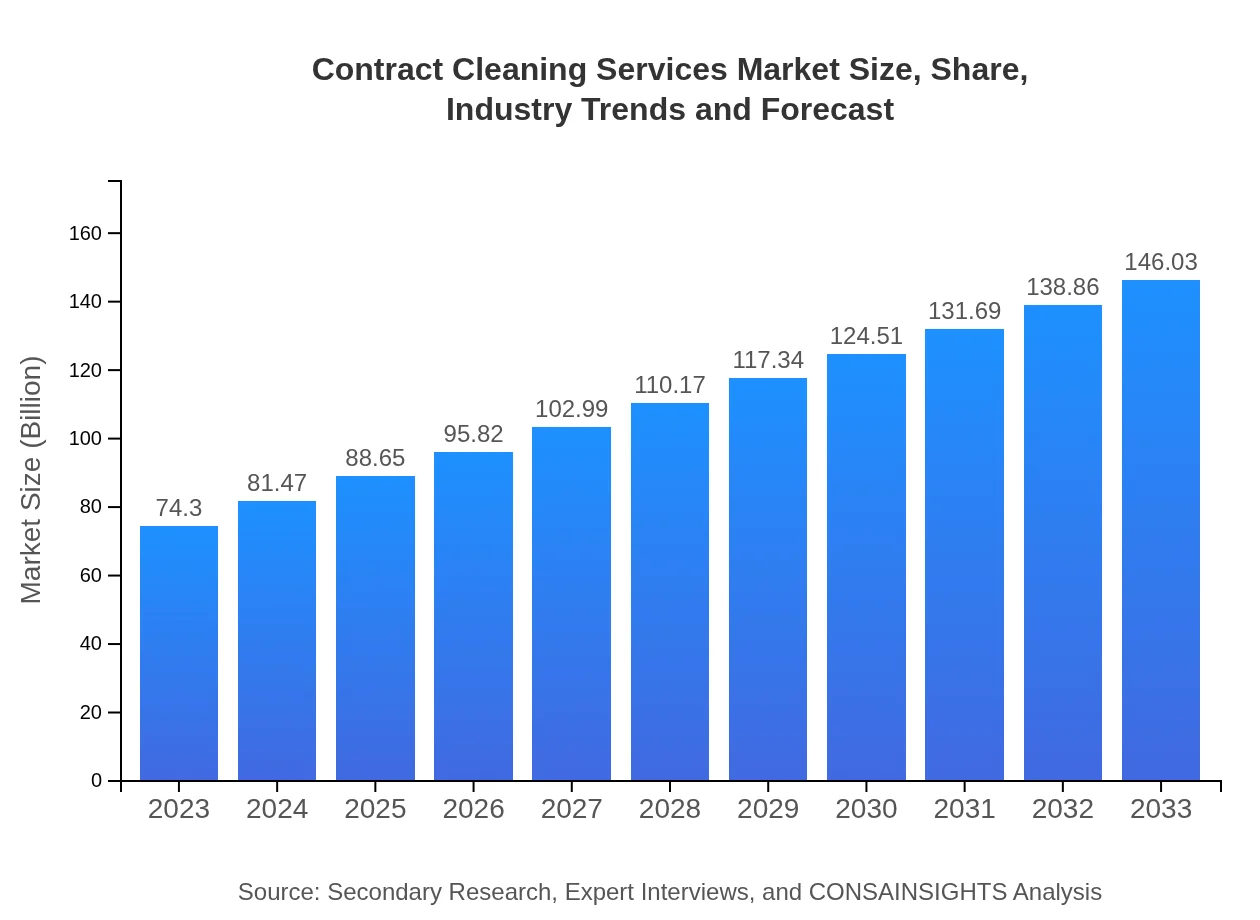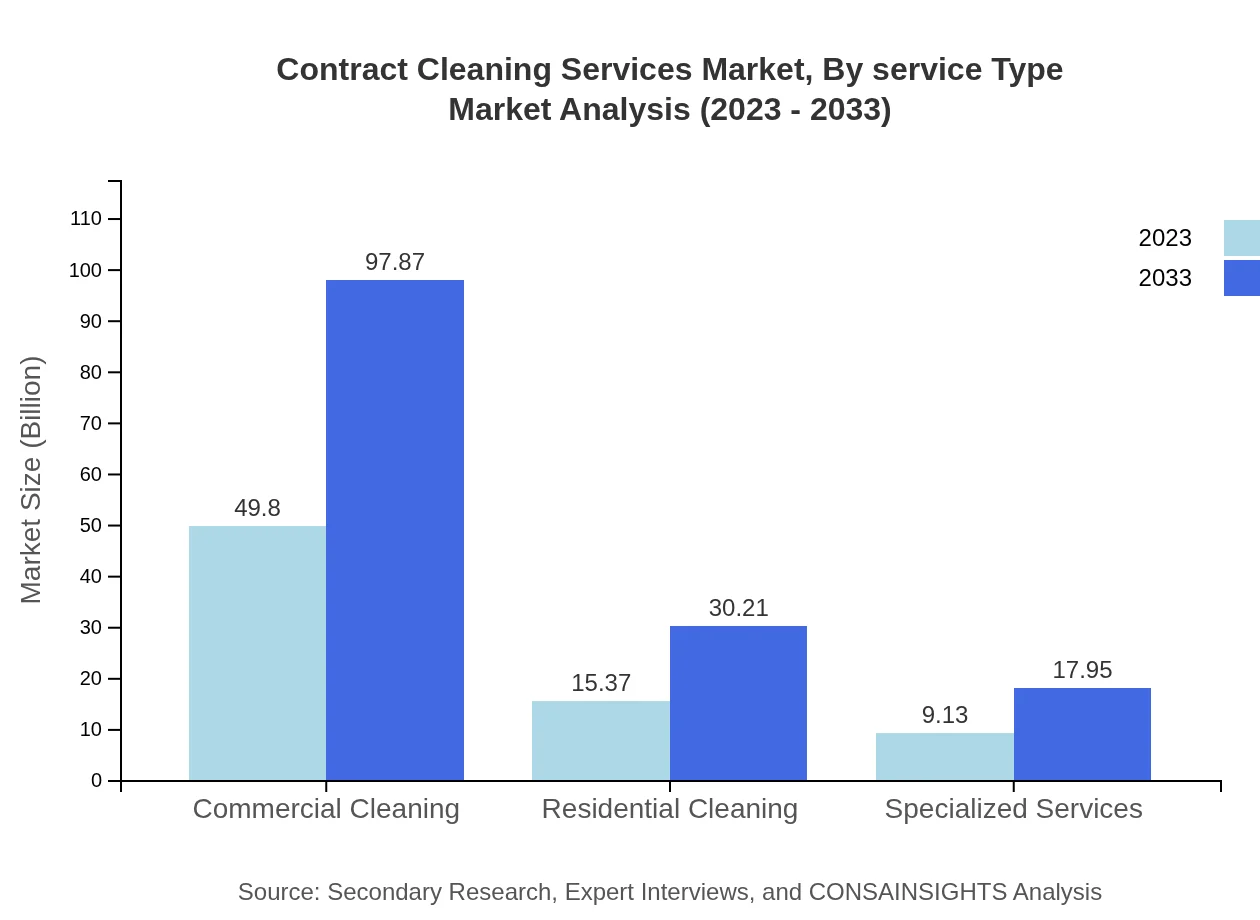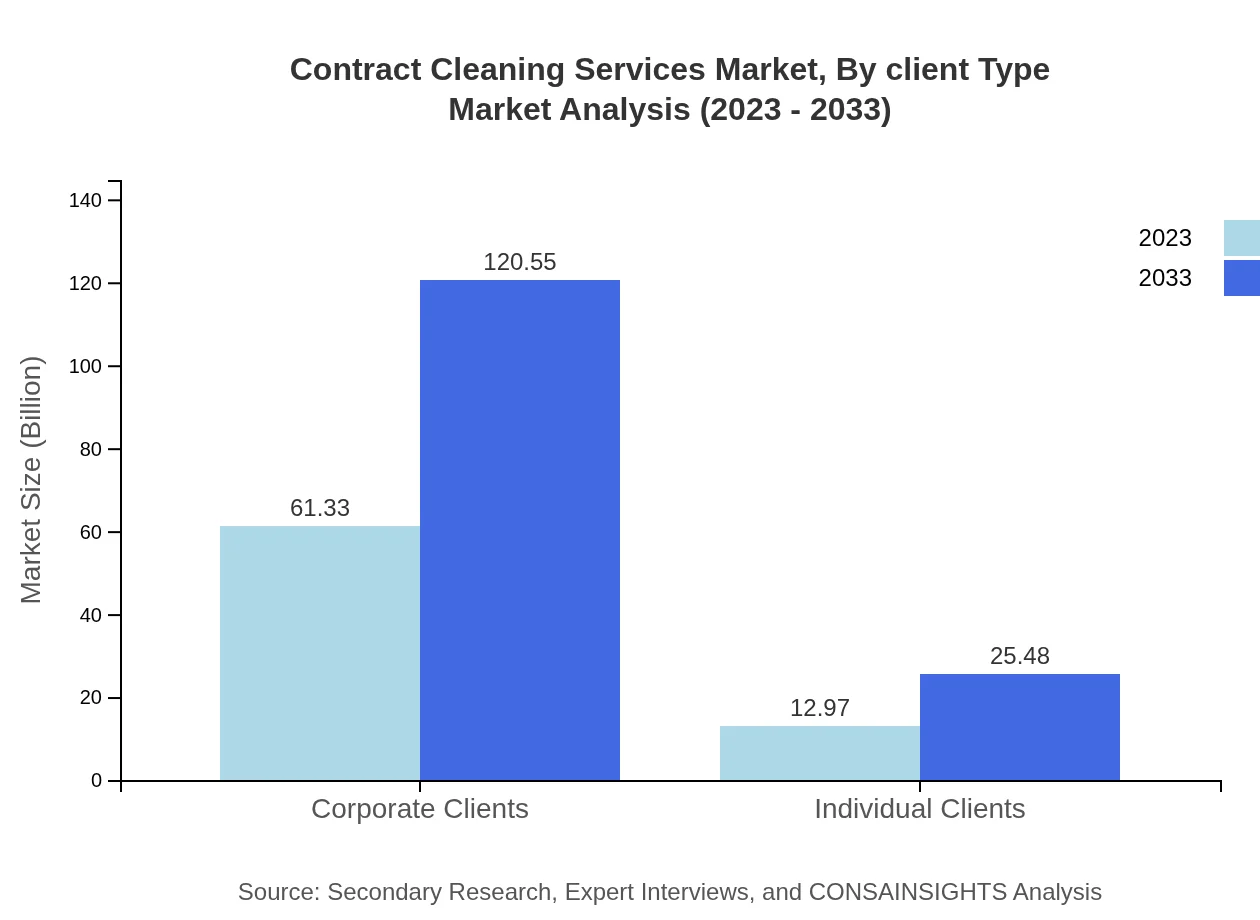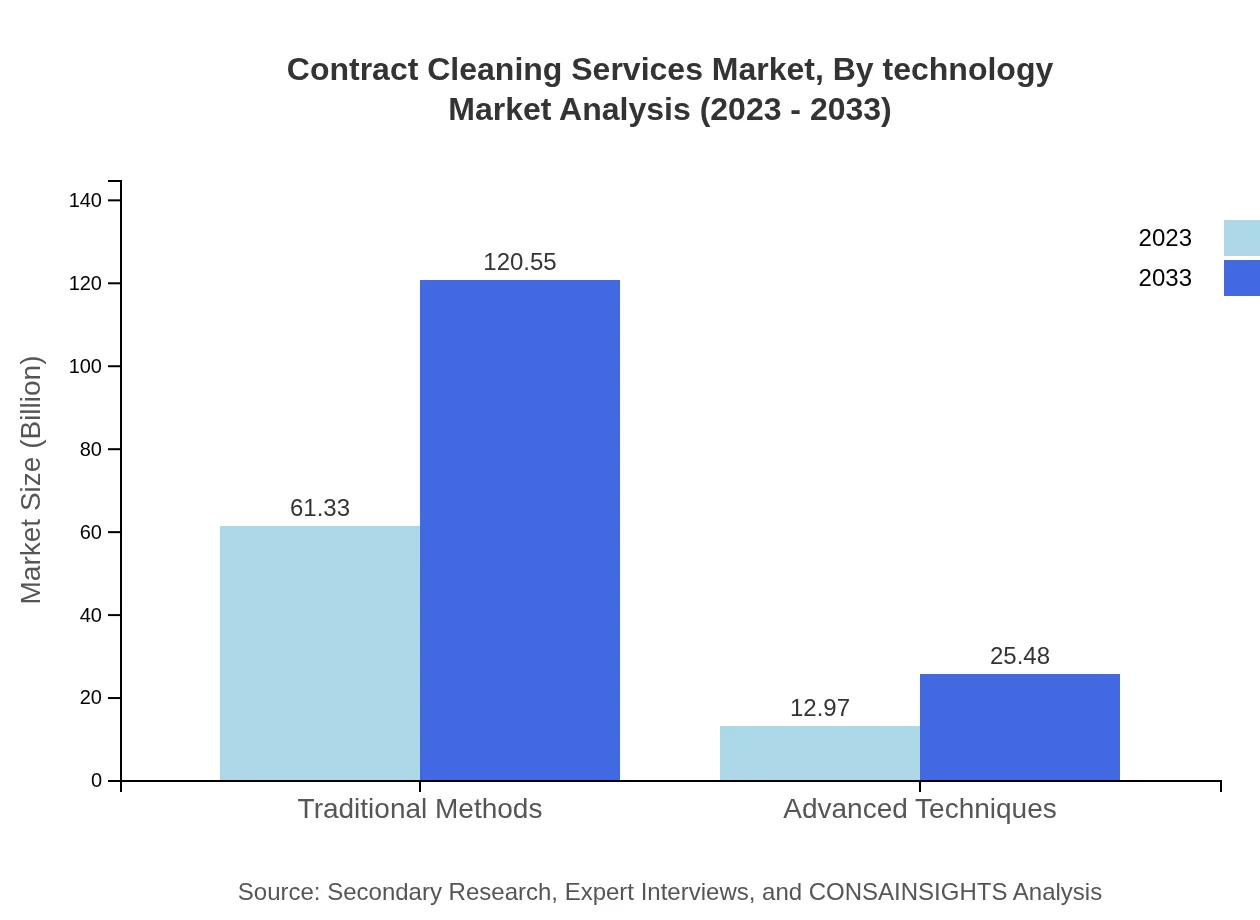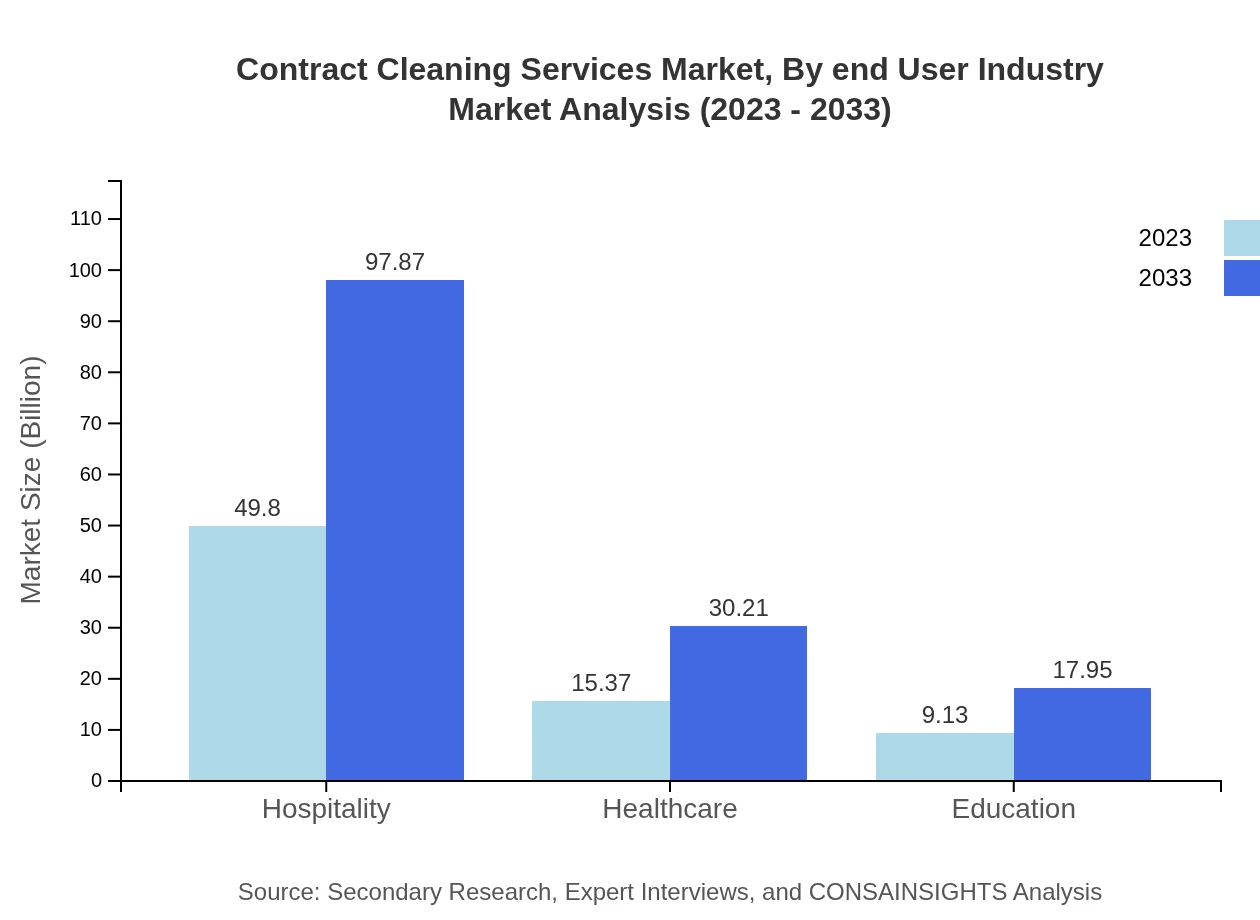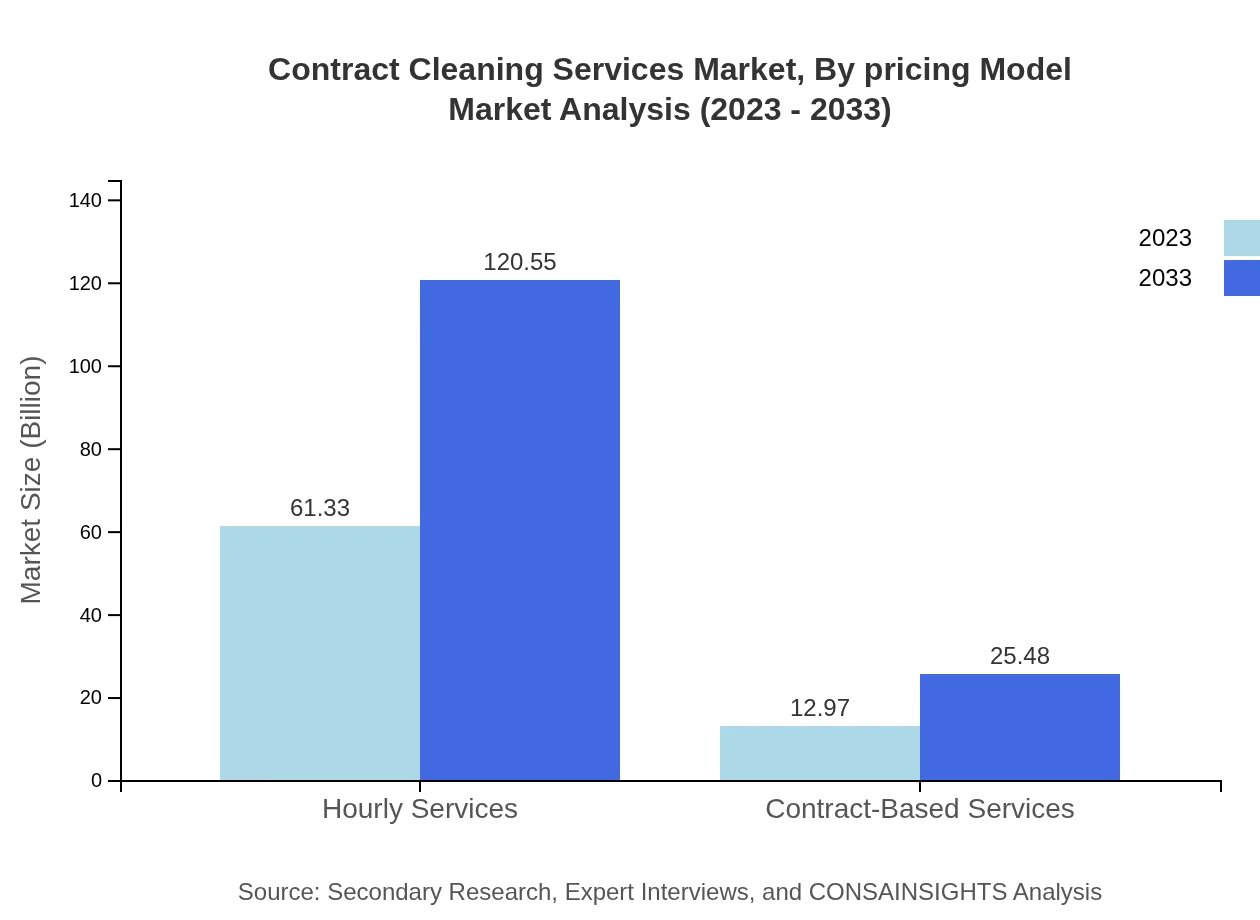Contract Cleaning Services Market Report
Published Date: 31 January 2026 | Report Code: contract-cleaning-services
Contract Cleaning Services Market Size, Share, Industry Trends and Forecast to 2033
This report provides an in-depth analysis of the Contract Cleaning Services market, offering insights into market size, trends, and forecasts for the period of 2023 to 2033. It covers various segments, regional analyses, and key players in the industry.
| Metric | Value |
|---|---|
| Study Period | 2023 - 2033 |
| 2023 Market Size | $74.30 Billion |
| CAGR (2023-2033) | 6.8% |
| 2033 Market Size | $146.03 Billion |
| Top Companies | ISS World, Sodexo, ABM Industries, Cleansolutions |
| Last Modified Date | 31 January 2026 |
Contract Cleaning Services Market Overview
Customize Contract Cleaning Services Market Report market research report
- ✔ Get in-depth analysis of Contract Cleaning Services market size, growth, and forecasts.
- ✔ Understand Contract Cleaning Services's regional dynamics and industry-specific trends.
- ✔ Identify potential applications, end-user demand, and growth segments in Contract Cleaning Services
What is the Market Size & CAGR of Contract Cleaning Services market in 2023?
Contract Cleaning Services Industry Analysis
Contract Cleaning Services Market Segmentation and Scope
Tell us your focus area and get a customized research report.
Contract Cleaning Services Market Analysis Report by Region
Europe Contract Cleaning Services Market Report:
The European market for Contract Cleaning Services was valued at $19.09 billion in 2023, anticipated to expand to $37.52 billion by 2033. The focus on sustainable cleaning practices and regulations aimed at reducing environmental impacts contribute to the market's growth. The region's diverse economies ensure a steady demand across various industry sectors.Asia Pacific Contract Cleaning Services Market Report:
In 2023, the Contract Cleaning Services market in the Asia Pacific region is valued at approximately $15.75 billion and is expected to reach $30.96 billion by 2033, driven by rapid urbanization and the expansion of the middle class which increases demand for both residential and commercial cleaning services. Additionally, a heightened focus on hygiene, particularly post-pandemic, has spurred growth in service demand across various sectors.North America Contract Cleaning Services Market Report:
North America stands at the forefront of the Contract Cleaning Services market with a valuation of $27.16 billion in 2023. By 2033, the market is projected to soar to $53.37 billion. The region's growth is propelled by a high standard of cleanliness expectations, stringent regulations, and increasing investments in automation technologies, thereby enhancing operational efficiencies.South America Contract Cleaning Services Market Report:
The market size for Contract Cleaning Services in South America is estimated at $3.99 billion in 2023, growing to approximately $7.84 billion by 2033. This region is characterized by an increase in corporate establishments and prestigious hospitality ventures, which are driving demand for professional cleaning services. Local companies are also discovering the benefits of outsourcing, boosting the service market.Middle East & Africa Contract Cleaning Services Market Report:
With an initial market size of $8.31 billion in 2023, the Middle East and Africa region is expected to reach $16.34 billion by 2033. Growth in this region is primarily due to infrastructural developments and a growing awareness of health and cleanliness standards, particularly in urban areas and healthcare facilities.Tell us your focus area and get a customized research report.
Contract Cleaning Services Market Analysis By Service Type
In the context of service types, the Contract Cleaning Services market shows that traditional methods are projected to grow from $61.33 billion in 2023 to $120.55 billion by 2033, maintaining a market share of 82.55%. Advanced cleaning techniques represent a smaller but fast-growing sector, with a size increase from $12.97 billion in 2023 to $25.48 billion by 2033, holding a 17.45% share.
Contract Cleaning Services Market Analysis By Client Type
When analyzed by client type, corporate clients dominate the market with a size projected to reach $120.55 billion by 2033 from $61.33 billion in 2023, representing 82.55% market share. Individual clients are increasingly engaging these services, growing from $12.97 billion in 2023 to $25.48 billion by 2033, making up 17.45% of the market.
Contract Cleaning Services Market Analysis By Technology
Looking at technological advancements in the market, innovations such as automation and smart technologies are reshaping the landscape. Firms implementing advanced machinery and software tools for scheduling, tracking, and executing tasks effectively are enhancing productivity within cleaning services, thus leading to increased adoption of these modern technologies.
Contract Cleaning Services Market Analysis By End User Industry
The end-user industry segmentation shows that commercial spaces, particularly those in hospitality and healthcare, are the largest consumers of contract cleaning services. The hospitality sector alone is forecasted to grow from $49.80 billion in 2023 to $97.87 billion in 2033, while the healthcare industry is expected to see similar growth, indicating a strong demand driven by regulatory requirements.
Contract Cleaning Services Market Analysis By Pricing Model
The pricing model analysis indicates a significant inclination towards hourly services and long-term contracts. Hourly service models are anticipated to maintain a dominant position in the market with continued growth projected due to flexible pricing and client needs. In contrast, contract-based services are gaining popularity, particularly among corporate clients looking for consistent service at a predictable cost.
Contract Cleaning Services Market Trends and Future Forecast
Tell us your focus area and get a customized research report.
Global Market Leaders and Top Companies in Contract Cleaning Services Industry
ISS World:
ISS World is a global leader in facility services, committed to delivering integrated cleaning solutions with a strong focus on sustainability and innovation.Sodexo:
Sodexo is a multinational corporation specializing in quality-of-life services across various sectors, including cleaning and facilities management, recognized for its client-focused approach.ABM Industries:
A leading provider of facility management services in the U.S., ABM Industries offers cleaning services driven by technology and operational excellence.Cleansolutions:
Cleansolutions specializes in eco-friendly cleaning services, catering to both commercial and residential markets while emphasizing sustainable practices.We're grateful to work with incredible clients.









FAQs
What is the market size of contract Cleaning Services?
The contract cleaning services market is currently valued at approximately $74.3 billion and is projected to grow at a CAGR of 6.8% from 2023 to 2033, indicating a robust expansion in the industry.
What are the key market players or companies in this contract Cleaning Services industry?
The contract cleaning services industry includes major players such as ISS A/S, ABM Industries, and Sodexo. These companies dominate the market through their extensive service offerings and global reach, contributing significantly to the growth of the industry.
What are the primary factors driving the growth in the contract Cleaning Services industry?
Key factors driving growth in the contract cleaning services market include increasing demand for hygiene, rising awareness of cleanliness in workplaces, and growing outsourcing trends where businesses prefer to contract cleaning services instead of maintaining in-house staff.
Which region is the fastest Growing in the contract Cleaning Services?
North America is currently the fastest-growing region in the contract cleaning services market, anticipated to grow from $27.16 billion in 2023 to $53.37 billion by 2033, reflecting a strong demand for cleaning services post-pandemic.
Does ConsaInsights provide customized market report data for the contract Cleaning Services industry?
Yes, ConsaInsights offers customized market report data tailored to specific needs in the contract cleaning services industry. Clients can request detailed analyses that fit their business requirements for informed decision-making.
What deliverables can I expect from this contract Cleaning Services market research project?
Deliverables from the contract cleaning services market research project include comprehensive reports on market size, growth trends, competitive analysis, consumer insights, and detailed segment data for strategic planning.
What are the market trends of contract Cleaning Services?
Current trends in the contract cleaning services market include a shift toward eco-friendly cleaning practices, the integration of technology in cleaning operations, and increased demand for specialized cleaning services tailored to various industries.

